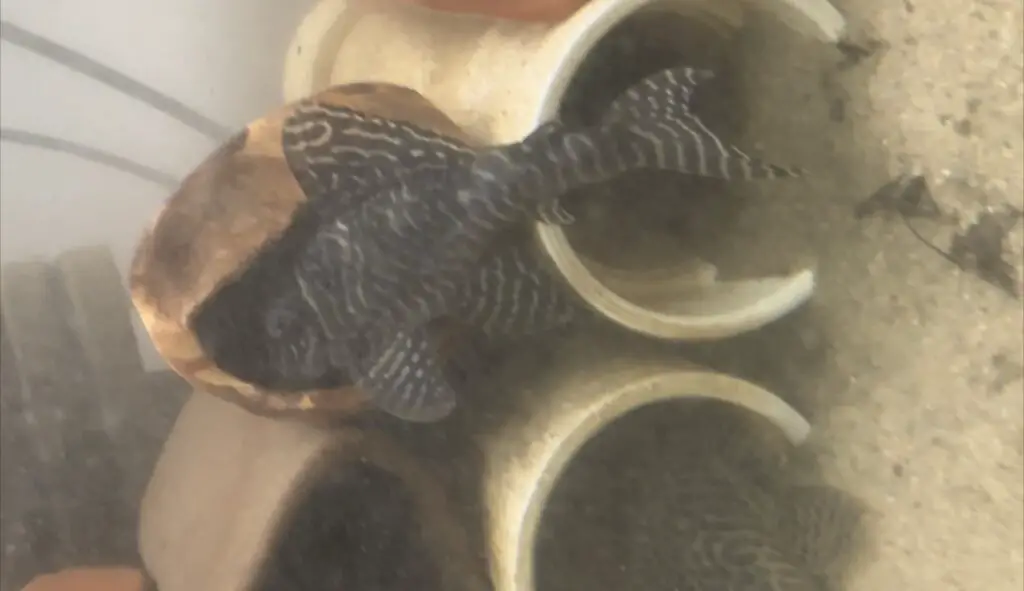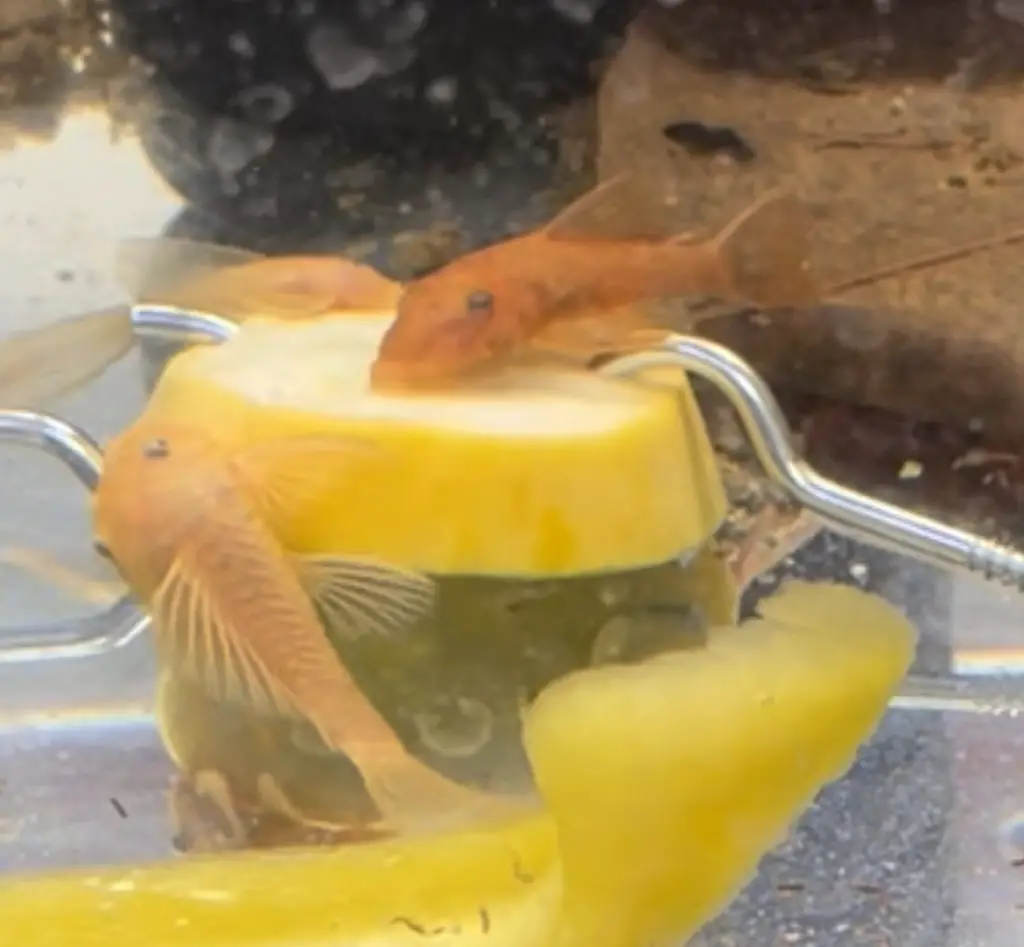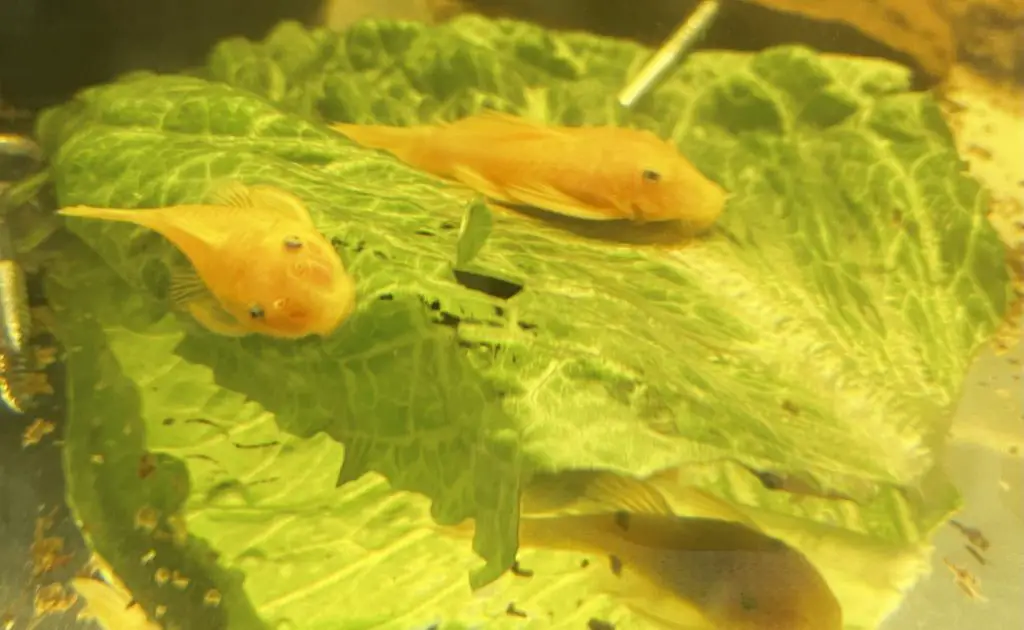Plecos are a popular type of fish known for their unique sucker mouths and ability to thrive in a variety of tank environments. However, like any other type of fish, plecos can sometimes be prone to illness.

Why is it so hard to tell if my pleco is sick?
It can be difficult for many people to tell if their pleco is sick for a few reasons. Plecos are generally a nocturnal fish and tend to be more active at night, so you may not see them during the day making it less likely for you to see any signs of sickness.
Plecos also have a natural tendency to hide, especially when they are feeling stressed or sick, so they may not be as visible as other fish in the tank.
Additionally, plecos are a scaleless fish and instead have bony plates. Do to them not having scales diseases present differently on them and can make it difficult to see underlying issues, such as parasites or fungal infections.
Finally, some common signs of illness in plecos, such as lethargy, loss of appetite, and abnormal behavior, can be subtle and easy to miss if you are not paying close attention to your fish.
Here are five common health problems that can affect plecos, as well as some tips for treatment and prevention:
Ich
Ichthyophthirius multifiliis, more commonly known as ich, is a common parasitic disease that can affect plecos and other types of fish. It is caused by a small, single-celled parasite that can live on the skin and gills of the fish.
Ich is characterized by white spots on the skin and gills, and it can cause respiratory distress, loss of appetite, and other symptoms in plecos. This is one disease that is hard to identify on plecos because ich isn’t as visible with them being scaleless.
To treat ich in plecos, you can use a medication specifically designed to kill parasites, such as a liquid or powder that is mixed into the fish’s food or water. One that I like to use is Seachem ParaGuard. It’s available at most pet stores and easy to find online.
When possible I always suggest putting the food and medicine in a cup or bowl of water and let it soak for a few minutes. The more medicine your fish consume with their food the more effective it works.
There are several different types of antiparasitic medications that will work to treat ich, and the most appropriate medication for your pleco will depend on the specific type of infection and the severity of the symptoms.
Another thing that can help cure ich is quite simple is raising the temperature of your fish tank for a few days. When you raise the temperature it speeds up the life cycle of ich, making ich weaker, so your fish have a better chance of getting better.
Popey disease
Popeye disease, also known as exophthalmia, is named due to the swelling of one or both eyes in fish.
The swelling can be caused by a few things, including bacterial infections, physical trauma, and nutritional deficiencies.
Bacterial infections are the most common cause of popeye disease and the most common bacteria to cause popeye are Aeromonas and Pseudomonas.
These infections can be secondary to other issues such as poor water quality, overcrowding, or injuries.
Physical trauma can cause popeye disease as well. Damage to the eye can happen if the fish is injured by sharp objects,if it gets caught in a pump or filter, or even fighting with other plecos or fish.
Nutritional deficiencies can also cause popeye, usually it’s a lack of vitamin A in your plecos diet.
Treatment of popeye depends on the underlying cause. Bacterial infections are usually treated with antibiotics, but it is important to identify the specific type of bacteria causing the infection in order to choose the appropriate antibiotic.
A medication that covers most bacterial infections is Fritz Aquatics Mardel Maracyn. I usually use the powder form because I can mix it into my fish’s food with some water but the more cost effective route is their liquid form.
If the popeye is caused by physical trauma, the best way to treat it is to separate fish into a hospital tank and allow the fish time to heal.
If the popeye is caused by a nutritional deficiency, it can be treated by feeding your plecos with food that is rich in the necessary nutrients.
This can be achieved by adding vitamin supplements to your fish food, or by providing them with a diet specifically formulated to meet plecos nutritional needs.
Fungal Infections
Fungal infections, while not common, can affect your plecos. Fungal Infections are a type of microorganism that can live on the skin, gills, or other areas of the fish’s body.
Fungal infections can cause white or gray patches on the skin, fin rot, and other issues. They can be serious and can lead to other health problems if left untreated.
When treating fungal infections in plecos, you can use a medication called a fungicide, which is specifically designed to kill or stop the growth of fungi.
A medication that covers most bacterial infections is Fritz Aquatics Mardel Maracyn. I usually use the powder form because I can mix it into my fish’s food with some water but the more cost effective route is their liquid form.
Fungicides are typically administered in the form of a liquid or powder that is mixed into the fish’s food or water. There are several different types of fungicides that are effective against a wide range of fungal infections in fish. Just look to make sure the medication you choose treats the specific type of fungal infection your fish have.
Bacterial Infections
Bacterial infections can occur when your pleco’s immune system is compromised or when it is exposed to dirty water or other contaminants.
Symptoms may include redness, swelling, and ulcerations on the skin, as well as lethargy, loss of appetite, and abnormal behavior. Bacterial infections can be serious and can cause other health problems if left untreated.
To treat bacterial infections in plecos, you can use antibiotics, which are medications that are specifically designed to kill or inhibit the growth of bacteria. Antibiotics are typically administered in the form of a liquid or powder mixed into the fish’s food or water.
Fritz Aquatics Mardel Maracyn is also what I like to use in this for bacterial infections. I usually use the powder form because I can mix it into my fish’s food with some water but the more cost effective route is their liquid form.
Bloat
Bloat is a condition that can affect plecos and the easiest way to tell if your pleco has bloat is if their stomach is enlarged or distended. One thing to watch out for is that when a female is ready to breed she will fill up with eggs and can look like she is bloated. Just make sure not to confuse the two.
It can be caused by a variety of factors, including constipation, internal parasites, or a bacterial infection. If left untreated, bloat can be serious and may lead to other health problems.
To treat bloat in plecos, it is important to identify the underlying cause of the condition and address it accordingly. Here are some treatment options for different causes of bloat:
Constipation
If the bloat is caused by constipation, the first thing you should try is feeding the pleco high fiber foods, such as peas, spinach, or lettuce, to help regulate the digestive system and relieve constipation.
You can deshell a fresh or frozen pea and mash it into a paste, then feed it to the pleco as part of its regular diet. You can also try feeding the pleco other high-fiber foods, such as spinach or lettuce, to help improve its digestive system.
Internal parasites
If the bloat is the result of internal parasites, such as worms or flukes, you can use a medication specifically designed to kill parasites, such as a liquid or powder mixed into the fish’s food or water.
Fritz Aquatics Mardel Maracyn is a medication that covers most fish ailments. I usually use the powder form because I can mix it into my fish’s food with some water but the more cost effect route is their liquid form.
Bacterial infection
If a bacterial infection is causing the bloat, you can use antibiotics, which are medications that are specifically designed to kill or inhibit the growth of bacteria. Antibiotics are also typically administered in the form of a liquid or powder mixed into the fish’s food or water.
Such as Fritz Aquatics Mardel Maracyn. I usually use the powder form because I can mix it into my fish’s food with some water but the more cost effect route is their liquid form.
It is important to keep in mind that bloat can have multiple causes and the appropriate treatment will depend on the specific cause of the condition. If the pleco is experiencing severe bloating or if the condition does not improve after a few days of treatment, it is important to consult with a veterinarian or a fish specialist for further evaluation and treatment. In some cases, medications may be necessary to resolve the issue.
Important information about medications
It is important to note that plecos can be sensitive to certain medications and it is important to use caution when administering any treatment. Some medications, such as copper-based treatments and formalin, can be toxic to plecos and should be avoided.
Prevention
To help prevent illness in plecos
- Maintain a clean and healthy tank environment: Regular water changes and the use of a high-quality filter can help to remove harmful bacteria and other contaminants from the water.
- Avoid overcrowding: Overcrowding can increase the risk of bacterial infections, as the fish may be more likely to come into contact with each other’s waste or bodily fluids.
- Quarantine new fish: When introducing new fish to your tank, it is important to quarantine them for at least a few weeks to ensure that they are not carrying any infections or parasites.
- Avoid feeding the pleco spoiled or contaminated food: Feeding the pleco spoiled or contaminated food can increase the risk of bacterial infections.
- Avoid exposing the pleco to stress: Stress can weaken the immune system and make the pleco more susceptible to bacterial infections.
By following these tips, you can help to prevent and treat the most common illnesses in plecos and keep your fish healthy and happy.


